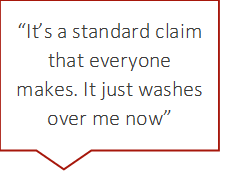
As brands and retailers start to make more changes to become sustainable and hit net zero targets, the more they want to communicate these changes to their consumers. However, there is still a lot of scepticism amongst consumers, who are increasingly aware of greenwashing, and therefore feel that claims lack credibility. Our Great Green Sustainability Study, which has now been running for 2 years, shows that 33% of consumers don’t believe claims that brands make about being environmentally-friendly, but this varies by the category or sector you operate in, with soft drinks in particularly struggling to convince consumers.
So, what can brands do?
Through both in-depth qualitative interviews and our large-scale quantitative survey, we have identified 3 key pieces of advice which should help your sustainability claims to stand out and quell consumer scepticism.
1. Focus on the present rather than the future

65% of people want to know what brands and retailers are currently doing to be environmentally-friendly; not what they will be doing. In addition, use of terms such as “we are committed to helping” are a lot less powerful than terms such as “we are helping” due to the use of future-based language.
Qualitative feedback suggested that there were concerns that by talking about a goal to achieve by a certain date, the changes needed to reach that goal won’t happen until much closer to the deadline. Consumers want to see change now.
2. Seeing is believing

It’s one thing to make a claim, but it’s another to actually prove it. Consumers want proof that what you claim is real through visual cues. This will instantly increase credibility.
Electric vehicles are a good example of this, where many retailers are talking about delivery vans being electrically-powered. Consumer scepticism tends to be lower for these types of claims, as they can actually see them on the road.
3. Avoid overly generic claims – be specific!

Generic claims lose credibility and authenticity. Through being more specific about what you are doing to be more sustainable, consumers will have a greater understanding of what you are trying to achieve and how. Simply saying “we will be NetZero by 2030” is just not enough; explaining the steps you are taking to achieve NetZero will be much more believable and appreciated.
To find out more about our Great Green Sustainability Study or how we can help you with sustainability research, contact Tom Gould, Head of Consumer, on tom.gould@impactmr.com.

